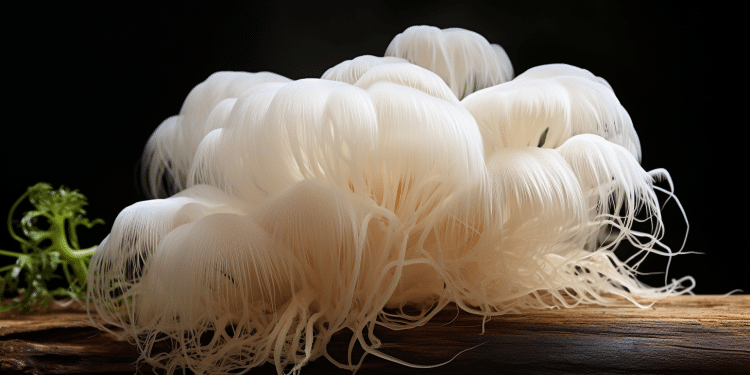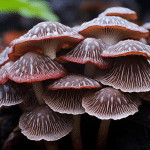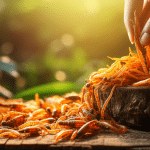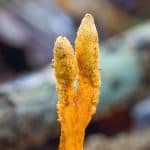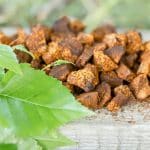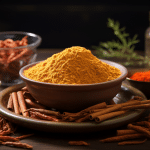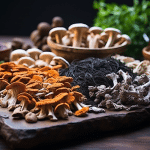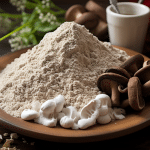With its long shaggy spines that resemble the voluminous mane around a lion’s face, it’s no wonder that Hericium erinaceus is best known as lion’s mane mushroom. Used for centuries in traditional Chinese medicine to support brain function and neurological health, this edible mushroom has long been valued for its fierce medicinal properties.
Here at Health by Mushrooms, we generally don’t like to play favorites among the different mushrooms we write about, but we can’t help ourselves when it comes to lion’s mane mushroom. Not only is it one of the most spectacular-looking mushrooms you’ll ever see, but it’s also full of health benefits and loaded with flavor when cooked fresh. If you like crab or lobster meat, then you’ll love the sweet-savory taste and tear-apart texture of lion’s mane.
Does Lion’s Mane Help With Nerve Regeneration?
One of the most studied and important benefits of lion’s mane mushroom is its effects on the brain and cognitive function, particularly in relation to neurodegenerative diseases like Alzheimers and Parkinsons. Scientists found that lions mane contains two specific compounds, hericenone and erinacine, that may help stimulate nerve regeneration and growth.
A 2016 report found that the lion’s mane mushroom and its extract not only reduced symptoms of memory loss in mice suffering from Alzheimers, but it also prevented the damage to neurons caused by some types of plaques. More importantly, studies showed that the “polysaccharides in the liquid extract of the lion’s mane mushroom may induce neuronal differentiation and contribute to the neuronal survival”. In other words, lion’s mane causes nerve regeneration, meaning the liquid extract of lion’s mane mushrooms contributes to the neuro-regenerative properties which may help heal damage to the brain!
Your nervous system sends signals between your brain, spinal cord, and the rest of your body.
One of the most groundbreaking discoveries regarding lion’s mane is that it actually induces neural growth factors, which repairs cells faster. A study in 2012 concluded that eating lion’s mane mushrooms could rebuild damaged cells in peripheral nervous injuries.
More Info On Lion’s Mane Mushroom
Also called Yamabushitake, Pom-Pom, Monkey Head, Bearded, or Hedgehog Mushroom, lion’s mane is a species found in North America, Europe, and Asia, growing mostly on hardwood trees that are either rotting or dying. Expanding far beyond its traditional Chinese medicinal roots, lions’ mane is now commonly used as a natural nootropic (aka “smart drug”) by biohackers and people looking for a brain boost to improve productivity, creativity, and mental toughness. While further studies are needed regarding lions manes effects in humans, the studies in animals have been promising thus far. Read on for more information about how lions mane might benefit you.
Additional Perks of Lion’s Mane
We all know the Lion is king of the jungle. And just like the awesome beast after which it is named, the lion’s mane mushroom is one of the strongest mushrooms on the planet. In fact, this medicinal mushroom has been shown to possess anti-bacterial, anti-cancer, antidiabetic, antifatigue, anti-inflammatory, anti-aging, anti-anxiety, cardioprotective, and neuroprotective properties, amongst a host of others.
Heart Health
Heart disease is one of the leading causes of death in the U.S., and two factors that may increase your risk for heart disease are obesity and elevated levels of triglycerides, also known as bad cholesterol. However, studies conducted in 2013 showed lion’s mane may enhance fat metabolism and has powerful activity to reduce cholesterol. Research in Japan suggests that lion’s mane may also help reduce the risk of a stroke or heart attack thanks to a compound called hericenone, which decreases blood clotting rates.
Immune System
Like all mushrooms, lion’s mane is loaded with antioxidants and beta-glucans, which combat oxidative stress and help to support proper immune responses. One study that evaluated the therapeutic benefits of 14 different species of mushrooms found lion’s mane to possess the fourth highest antioxidant activity, and other studies demonstrate its anti-inflammatory effects in people suffering from inflammatory bowel diseases, among many other conditions.
Gut Health
Many of us know by now that gut health is directly linked to a stronger immune system – 70-80 percent of your immune cells are found in your intestines, after all. While more human clinical trials are needed, studies done in mice suggest lion’s mane may help boost intestinal immune responses, and protect cells from bacterial infections, even increasing longevity.
Anxiety and Depression
There is an increasing body of evidence suggesting inflammation plays a role in depression and anxiety, and anti-inflammatory substances like lion’s mane extract may be helpful. A 2018 study in mice demonstrated how lion’s mane extract offered antidepressant-like effects over the course of a two-week period, and another study showed amycenone – a brain activator found in lion’s mane extract – leads to anti-inflammatory and antidepressant responses.
Fights Cancer
But growing studies suggest lion’s mane may be a powerful candidate to treat cancer, partly due to its particular compounds. Several tests show lion’s mane mushrooms to possess cancer-fighting properties against a broad spectrum of diseases, including leukemia, stomach cancer, lung cancer, liver cancer, colon cancer, and breast cancer. One study even found that Hericium erinaceus extracts dramatically reduced the number of metastasizing tumor cells.
Best Way To Take Lion’s Mane
If you can find them fresh, you absolutely need to try cooking up a few lion’s mane mushrooms as a part of your next recipe. Not only is it delicious, but it has many benefits besides just its taste, as you learned. That said, it is not exactly easy to come by. You are probably better off using supplements like our strong powdered extracts from lion’s mane, so that you can reap the benefits of its healing properties in concentrated amounts.
You can find our favorite capsules, powders, and tincture’s on the following pages of our website and learn more about each individually:
Click here for Our Favorite Lion’s Mane Supplements
Click here for Our Favorite Lion’s Mane Powders
Click here for Our Favorite Lion’s Mane Tinctures
Click here for Our Favorite Lion’s Mane Gummies
These products are made by taking whole fruiting mushrooms, and then performing hot water extraction (sort of like making soup broth or bone broth) in order to preserve its health-giving properties. Once this is done, the liquid is spray dried to produce a fine powder, which you can either encapsulate, or add into your coffee, tea, smoothie, or whatever you are eating.
For fresh mane of the lion, look at the local farmers market or Asian markets. While it is not as common as some of the other edible mushrooms, you can not go wrong finding lion’s mane in a health food store or an organic market. You can always ask your local grocery store if you can have it specially ordered. But, as mentioned, probably the easiest thing is just to purchase lion’s mane supplements online.
Additional Resources:
Lion’s mane mushroom for anxiety
Updated 10/12/2022
